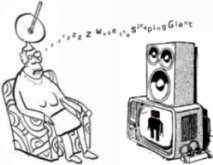 This essay provides a theoretical foundation on the social psychological roots of authoritarian character traits produced by capitalist societies, which have remained consistent up to the present day and which have created the conditions necessary for modern forms of oppression and cruelty.
This essay provides a theoretical foundation on the social psychological roots of authoritarian character traits produced by capitalist societies, which have remained consistent up to the present day and which have created the conditions necessary for modern forms of oppression and cruelty.In the early modern period, the bourgeoisie was defined in terms of its struggle to emancipate itself from the shackles of feudal society and absolute monarchy. The bourgeoisie, weak to win this struggle on its own, was often forced to form an alliance with the lower classes, which also had an interest in overthrowing feudalism and absolute monarchy. The alliance between the bourgeoisie and the lower classes was not an easy one, in that the historical experiences of these groups on the new social order basically differ from the very beginning. The historical development of the bourgeoisie, on the one hand, was characterized as a process of unrestrained pursuit of their self-interest (egoism); the lower classes, on the other hand, experienced the development of capitalism passively and had fewer opportunities to satisfy their material and psychological needs.
In bourgeois anthropology, man by nature is egoistic. In the context of heightened economic and social contradictions, free competition was seen as leading to a state of war between individuals. Morality, then, was promoted and imposed officially by the Church ideally to restrict the ever-increasing free competition. Bourgeois concept of virtues such as self-discipline, self-denial, obedience, and submission were instilled in the masses by coercion and persuasion in favor of the “common good”. The contradictions contained in this bourgeois morality was that it served as a means of domination and a mechanism to further suppress the material interest of the masses, i.e. collective action.
Horkheimer expounds the concept of bourgeois anthropology by providing a genealogy of bourgeois freedom movements – particularly, bourgeois leaders in the medieval Italy (Cola di Rienzo; Savanarola), religious leaders (Luther; Calvin) of the Reformation movement, and the bourgeois leader (Robespierre) of the French Revolution. Each case has a particular dynamic developing between the charismatic leaders of these movements and their mass followers. The intense repression imposed upon the masses in the feudal order produced deep discontent, which was manipulated by bourgeois leaders to further their own ends. Leaders of bourgeois pseudo-revolutions magnified themselves as the “redeemer” of the people. While promising freedom, equality, and justice to the masses whose support they depended, they actually represented the interests of the ruling strata and served to perpetuate injustice. Though leaders were capable of inciting the people to rebel against the prevailing conditioned, they never intended to destroy the masses’ disposition toward blind faith in authority. Their appeals to the masses always stopped short of showing them how they might truly realize their own interests, their class consciousness, since from the very beginning, the bourgeois interests were not identical with those of the lower classes.
The historical situation determines the character of the bourgeois leader. Covertly, his actions correspond to the interests of the ruling sectors; overtly, he presents himself as “one of the masses”. The less his policies coincide with the immediate interests of the latter, the more the leader’s character is magnified into “charisma”. Contradictions contained in the character of a bourgeois leader are inherent for their achievement and historical function in the bourgeois world.
Horkheimer takes Freud’s concepts to show how high levels of repression reinforce certain psychological mechanisms among the masses. The egoism of the bourgeois, the unrestricted utilitarian drive, is the real “destructive drive”; the egoism of the masses for collective action is the universally denounced and disavowed one, manipulated by ideological practices.* Although the masses are prohibited from realizing their own consciousness, they nevertheless are capable to function as a motor to drive the process forward. The masses in the pseudo-revolution are set in motion by the more conscious and alert bourgeois wing. The repressed libidinal energy (repressed aggression for collective action) of the masses does not simply disappear, but is pushed into the unconscious, where its strength grows and develops. This surplus aggression is appropriated by the leaders to strengthen their dominion over the masses. Not only do the leaders encourage the masses to sacrifice themselves for the common good, and to identify with the leaders as the representatives of that community, they also provide the masses with objects for their surplus aggression. Directing their aggression against the “enemies of the people” (e.g. perceived tyrants, dictators) not only provides the masses with targets of their unconscious resentment, it also reinforces their sense of belonging in the community of followers. This sense of belonging, including the illusory “love” of the leaders for the people, provides psychological compensation for the material sacrifices of the masses.
Horkheimer’s concept of the bourgeois mechanisms of domination can be connected to Zizek’s concept of Master: its condition of possibility always depends on its obscene Other. In the context of today’s capitalism, domination is concealed by the superficial independence of subjects. No visible authoritarian Master imposes what the subjects should do. What the subjects now have is an invisible obscene Master which appears as one of its subjects. This Master sustains itself as long as its subjects do not experience as not fully in its grasp, as long as its real dimension remains hidden. The Master will only disintegrate when its phantasmic support breaks.

